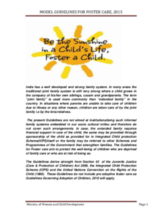Introduction
India has a well developed and strong family system. In many areas the traditional joint family system is still very strong where a child grows in the company of his/her own siblings, cousin and grandparents. The term “joint family” is used more commonly than “extended family” in the country. In situations where parents are unable to take care of children due to illness or any other reason, children are taken care of by the joint family i.e by the kins/relatives.
The present Guidelines are not aimed at institutionalising such informal family systems embedded in our socio cultural milieu and therefore do not cover such arrangements. In case, the extended family requires financial support in care of the child, the same may be provided through sponsorship of the child as provided for in Integrated Child protection Scheme(ICPS)itself or the family may be referred to other Schemes and Programmes of the Government that strengthen families.
The Guidelines for Foster care aim to protect the well-being of children who are deprived of family care or who are at risk of being so. The Guidelines derive strength from Section 42 of the Juvenile Justice (Care & Protection of Children) Act 2000, the Integrated Child Protection Scheme (ICPS) and the United Nations Convention on the Rights of the Child (1989). These Guidelines do not include pre adoptive foster care as Guidelines Governing Adoption of Children, 2015 will apply.

